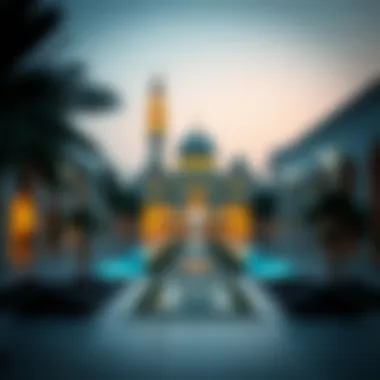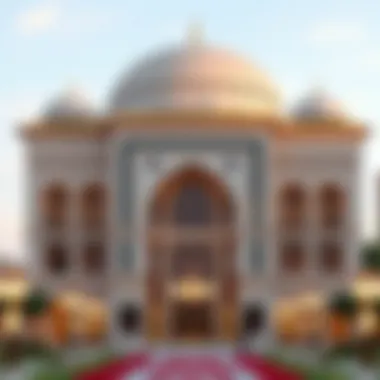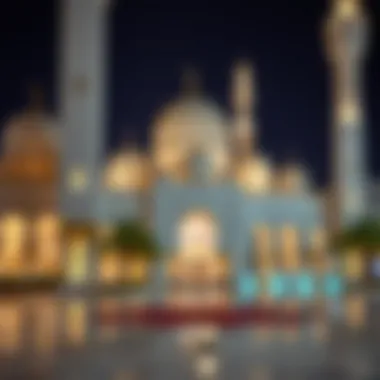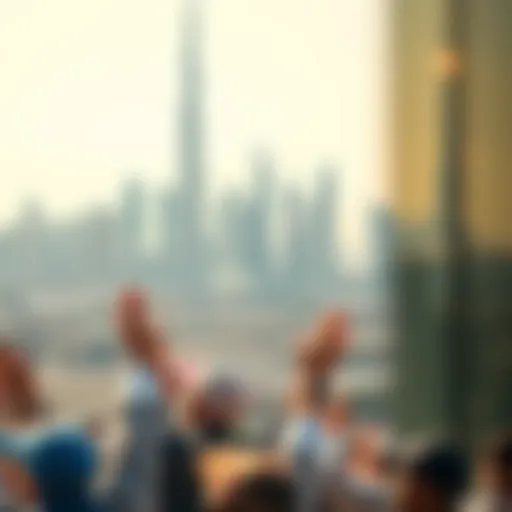First Ramadan 2024 in the UAE: Significance and Timing


Intro
Ramadan, a sacred month in the Islamic calendar, holds great significance for Muslims worldwide, particularly in the United Arab Emirates. The year 2024 marks the arrival of the first Ramadan that will be heavily influenced by the intersection of modern life and traditional practices. Understanding the timing of this month is crucial, as it does not follow the Gregorian calendar, instead relying on the lunar cycle, which can lead to variances in start dates across different countries.
In the UAE, Ramadan is not merely a time of fasting; it encompasses a transformative influence on various aspects of daily life, from cultural practices to economic activities. The particularities of Ramadan 2024 will be shaped by unique factors such as the local climate, public regulations, and community involvement. Furthermore, the implications of this holy month extend into the real estate market, especially in a dynamic city like Dubai where investment trends and property activities experience notable shifts during Ramadan.
As we delve further into the topic, we will explore market trends, property insights, and the broader cultural implications of Ramadan in the UAE.
Market Trends
Understanding the market trends during Ramadan provides essential insights, especially for investors and homeowners looking to make informed decisions in Dubai's competitive landscape. Historically, Ramadan creates a unique environment that influences both consumer behavior and market dynamics.
Current Market Analysis
As of early 2024, the Dubai real estate market is recovering steadily from recent economic fluctuations, and Ramadan is expected to play a pivotal role in shaping short-term trends. Generally, during this holy month, there is a spike in property viewings as families seek new homes or investment properties. Despite the fasting hours, evenings in Dubai come alive, presenting opportunities for potential buyers and renters to explore available properties.
Urban areas, especially neighborhoods with a high concentration of expatriates, see increased interest during this time. Notably, areas such as Dubai Marina and Downtown Dubai mark themselves as hotspots during Ramadan as communal iftars and cultural events create a welcoming atmosphere for visitors and residents alike.
Future Projections
Looking ahead, the real estate dynamics throughout Ramadan 2024 could signal long-term investment opportunities. Analysts suggest that if the current recovery trend continues, property prices may stabilize, ultimately benefiting buyers looking for affordable housing options. Investors might see this month as a critical period for identifying undervalued assets.
Real estate experts anticipate the possibility of a more pronounced seasonal shift in demand. The culmination of Ramadan with Eid al-Fitr also tends to lead to a rush in market activity, prompting homeowners and investors to act quickly.
Property Insights
In navigating the landscape of real estate, understanding various property types and areas can greatly aid buyers and investors in making suitable choices aligned with their needs during Ramadan.
Neighborhood Comparisons
Several neighborhoods in Dubai embody different aspects of life during Ramadan, catering to diverse demographics and preferences:
- Jumeirah Beach Residence: Known for its vibrant lifestyle, this area offers many options for social interaction. The beachside markets and restaurants come alive during iftar, making it appealing for families.
- Al Qusais: For those seeking budget-friendly options, Al Qusais provides various amenities, ideal for families looking for spaces that resonate with the community spirit during Ramadan.
- Arabian Ranches: This suburban neighborhood caters to those wanting a quieter environment. It hosts various family-friendly activities that align with the Ramadan ethos of togetherness.
Property Types Explained
When exploring property types, one can typically find:
- Apartments: High-rise apartments often provide modern living experiences with amenities that enhance convenience during Ramadan.
- Villas: For larger families, villas offer the space needed for gatherings, especially during iftar and suhoor.
- Townhouses: Striking a balance between apartments and villas, townhouses are a suitable option for those who want community living with some privacy.
Investors and buyers alike must consider both their lifestyle needs and investment strategies when approaching the market during this holy month. As Ramadan unfolds, the dynamics of real estate within the UAE are amplified, illustrating the connection between cultural significance and economic activity.
Prologue to Ramadan
Ramadan stands as one of the most significant periods in the Islamic calendar, draped in a rich tapestry of tradition and spiritual depth. This month is more than just a time of fasting; it serves as a poignant reminder of faith, community, and the importance of introspection. In the context of the UAE, where a diverse array of cultures converge, Ramadan takes on distinct hues and practices, making its observance particularly unique.
The essence of Ramadan is deeply rooted in the observance of fasting from dawn until dusk, during which Muslims not only abstain from food and drink but also engage in a heightened devotion to prayer and reflection. This sacred month often leads to discussions about personal growth and communal ties, which are especially relevant when one considers the multicultural fabric of the UAE.
It's crucial for investors, homebuyers, and business people to grasp not just the religious aspects, but also the economic implications intertwined with Ramadan. For instance, the timing of this holy month can influence market behaviors, from retail shifts driven by demand for Iftar meals to the adjustments businesses make in working hours.
In summarizing, understanding Ramadan provides insights that extend beyond mere religious observance. It fosters deeper connections within communities, stimulates economic changes, and enriches the UAE’s cultural landscape, thus holding significance for every individual, regardless of their background.
First Ramadan of 2024: Key Dates


Understanding the key dates of Ramadan in 2024 is not just an exercise in calendar-keeping; it’s essential for planning various cultural, religious, and even economic activities in the UAE. As this month is a pivotal time for millions, knowing when it starts can influence a range of aspects from social gatherings to investment opportunities.
The lunar calendar, upon which the Islamic calendar is based, cycles through its phases, which means the actual sighting of the moon determines the precise start of Ramadan every year. In 2024, it is widely anticipated that Ramadan will commence around the evening of Sunday, March 10, with the first full day of fasting being on Monday, March 11. However, it’s important to remember that moon sightings can lead to slight variations in the date, causing communities to observe Ramadan either a day earlier or later, depending on local observations.
Anticipated Start Date in the UAE
The expected start date of Ramadan not only marks the beginning of fasting but also signals a shift in the rhythm of daily life. For expatriates and locals alike, the anticipation builds as communities prepare. Iftar gatherings are planned, and businesses adjust their operating hours, showcasing a potential opportunity for companies to capitalize on the increased foot traffic and demand for traditional foods and services.
Factors influencing the start date include:
- Moon sighting committees' advisories
- Variances in lunar cycles globally
- Community customs and practices
For many, this first day of fasting is a moment of reflection and renewed commitment to spiritual practices. It’s a time to connect with community, family, and oneself, setting the tone for the days to come.
Lunar Calendar Calculations
Lunar calendar calculations are a blend of ancient tradition and modern astronomy, underpinning the very essence of Islamic observances. Unlike the Gregorian system, which is solar-based, the lunar calendar follows the moon’s phases, which lasts approximately 29.5 days. This fact leads to a calendar year that is about 10-12 days shorter than the solar year, so each year Ramadan shifts earlier.
In preparation for 2024, scholars and astronomers will be watching the moon's transition closely. The way it appears in the night sky will answer important questions for millions about when to begin fasting.
The critical elements to consider in lunar calculations include:
- Visibility of the Crescent Moon: Local committees will often look for the new moon, indicating the start of Ramadan.
- Time Zones: Different regions can have varying timing for moon sightings, potentially influencing when Ramadan starts in different parts.
- Cultural Variations: Some communities may follow calculations rather than sightings, impacting how the month is observed.
Thus, while the anticipation grows towards this holy month, its commencement remains tethered to celestial events that communicate more than mere dates—they convey an age-old practice essential to Islamic faith.
Cultural Practices During Ramadan in the UAE
Ramadan holds a prominent place in the cultural tapestry of the UAE, serving as a period steeped in spiritual growth, communal harmony, and reflection. During this holy month, the daily routines of both citizens and residents shift significantly, emphasizing a collective adherence to Islamic teachings paired with deep-rooted traditions. This section delves into the specific elements of cultural practices, highlighting how they foster a sense of belonging and community spirit.
Observance of Fasting
Fasting during Ramadan is not merely about abstaining from food and drink from dawn until sunset; it embodies a deeper spiritual and communal experience. Day after day, individuals across the UAE observe this sacred ritual, which prompts self-discipline and a more profound connection to faith. The iftar meal, breaking the fast daily, becomes a moment of unity. Families and neighbors gather, creating an atmosphere of togetherness that transforms otherwise ordinary evenings into cherished gatherings.
The importance of fasting transcends dietary restrictions. It’s a time for self-reflection, empathy towards those less fortunate, and a reminder of the principles of moderation and gratitude. The act of controlling one’s desires promotes a mental and spiritual clarity that many seek, making Ramadan a month of personal improvement, growth, and renewal.
Moreover, the UAE being a melting pot of cultures adds a distinct flavor to how fasting is observed. You’ll find various cultural takes on the iftar meal spilling onto the streets, from traditional Emirati dishes to a mix of international cuisines, reflecting the diverse population living in harmony.
Iftar Traditions in Dubai
Dubai, known for its ultramodern architecture and opulent lifestyle, juxtaposes this with heartwarming iftar traditions. The iftar meal signals the end of the day’s fast, often commenced with dates and water, following the Sunnah of the Prophet Muhammad. What’s significant is that this seemingly simple act is steeped in generosity and hospitality.
Local eateries and five-star hotels alike roll out extravagant buffet spreads during Ramadan. Establishments like Al Fanar and Bice Mare are known for their rich offerings, combining traditional dishes such as harees and luqaimat with more contemporary culinary delights. People eagerly line up to experience these meals, making the event truly communal.
*"The essence of hospitality shines during Ramadan; it’s not just about eating together but about bond-sharing around the table."
Outside formal settings, you'll often see individuals distributing free meals, snacks, and water to those who are fasting. This practice encapsulates the spirit of charity that Ramadan nurtures across the UAE, as it emphasizes compassion and giving back to the community.
Communal Prayers and Spiritual Activities
As the sun sets and the iftar is shared, the call to prayer resounds throughout the UAE, inviting believers to participate in communal prayers. The Taraweeh prayers held at night are particularly significant, as they offer an opportunity for deeper engagement with the Quran through recitation and reflection. Mosques fill up, showing remarkable participation, not just from practicing Muslims but also from diverse onlookers intrigued by this beautiful expression of faith.
In addition to spiritual gatherings, the month includes various activities like Quran recitation competitions, lectures, and community outreach programs. These initiatives not only strengthen religious ties but also promote inclusivity, allowing individuals from various backgrounds to appreciate the values of Ramadan. Ramadan tents, a staple in the UAE, pop up around the city, providing a space for people to gather, converse, and reflect together.
Impact of Ramadan on Daily Life in the UAE


Ramadan is more than just a month of fasting; it is a time that profoundly influences daily activities across the UAE. This holy period molds social dynamics, modifies routines, and fosters community spirit. Understanding this impact is essential for investors, homebuyers, and anyone engaged with urban life in Dubai and beyond.
Changes in Work Hours
During Ramadan, the working hours undergo a recalibration. Many companies adjust their schedules to accommodate the needs of employees observing the fast. Typically, the workday is shortened, often starting later in the morning and ending earlier in the afternoon. For instance, a common practice is to shift to a six-hour workday, which eases the strain on those who need to balance professional commitments with spiritual observances.
Employers recognize the need for flexibility during this month. By transforming their frameworks, businesses not only comply with cultural norms but also build goodwill among their employees. This atmosphere of understanding enhances workplace morale, indirectly benefiting overall productivity. It’s a quietly powerful example of cultural sensitivity in practice.
Culinary Offerings and Market Adjustments
As the sun sets, culinary offerings take center stage in the UAE. Iftar, the meal to break the fast, transforms dining scenes in homes and restaurants alike. Establishments prepare special menus featuring traditional foods, such as dates and lentil soup, to honor this time of reflection and community.
Moreover, markets adapt to the rhythm of Ramadan. Vendors stock up on food items that are particularly popular during this month, from sumptuous platters of grilled lamb to decadent desserts like baklava. Grocery stores extend their evening hours, catering to the bustling crowds seeking ingredients for the evening feast.
Interestingly, prices can fluctuate too. Some products see a spike in demand, causing costs to rise, while others may be discounted to encourage sales. Thus, knowing the shifting landscape can help savvy shoppers, making it essential for potential investors and homebuyers to comprehend these seasonal economic dynamics.
Social Interactions and Celebrations
Ramadan is also the catalyst for enhanced social interactions. Families gather for iftar, uniting in shared meals that strengthen bonds and promote a sense of belonging. These gatherings extend beyond family ties; neighbors and even acquaintances join in the spirit of communal eating.
Additionally, many organizations host communal iftars, fostering inter-community dialogue and enriching cultural ties. For instance, local charities arrainge large events that serve not only food but also goodwill, further embedding the essence of Ramadan into the social fabric of the UAE. In a place where diversity is celebrated, the holy month serves as a beautiful reminder of unity and shared values.
"In Ramadan, we remember the importance of kindness and compassion. The spirit of giving flows stronger than ever."
In summary, during this holy month, life in the UAE takes on a distinctive flavor. Everything from work schedules to dining experiences and social interactions undergo a transformation. These changes are not simply routine adjustments; they reflect a larger cultural ethos that impacts all who live and work in this multifaceted region.
Ramadan and the Dubai Real Estate Market
Ramadan holds a significant weight in Dubai, and its influence extends well beyond the realms of spirituality and cultural activities. The holy month can have a peculiar effect on various sectors, and one area that often sees palpable impacts is the real estate market. Understanding this relationship is crucial for investors, homebuyers, and real estate professionals seeking to navigate the intricacies of the market during this time.
Shifts in Market Demand During Ramadan
During Ramadan, the rhythm of daily life drastically changes. Activities slow down during the day, with many individuals focusing on prayer, reflection, and fasting. However, this temporary shift fuels a unique change in demand for properties.
- Increased Interest in Short-term Rentals: As families gather for Iftar dinners, many anticipate welcoming guests from different emirates or countries. This often leads to a surge in demand for short-term rental properties. Properties in neighborhoods known for vibrant dining options attract considerable interest.
- Focus on Family-Oriented Developments: The essence of Ramadan revolves around family and community. This cultural focus results in a heightened interest in family-oriented homes. For instance, properties with spacious living areas that accommodate gatherings see heightened demand during this period.
Moreover, it is not uncommon for developers to align their property marketing strategies with Ramadan. They may offer promotions or flexible financing options to entice potential buyers who are more inclined to secure a property, considering the festive spirit and sense of community.
Impact on Property Investment Decisions
Ramadan’s influence shapes not just the demand for properties, but also affects how potential investors make decisions. Investors tend to adopt a more cautious approach during this holy month. Here's how:
- Timing Considerations: Many investors prefer to wait until after Ramadan, when the usual hustle and bustle resumes, believing that property prices might stabilize or even drop post-festival season. This seasonal caution could steer some investors to delay purchases.
- Community and Charity Focus: The spirit of giving during Ramadan can shift an investor’s mindset toward more community-focused developments. Investors may find themselves gravitating towards projects that offer social value, such as mixed-use developments which not only house families but also involve commercial spaces catering to the community.
- Increased Scrutiny: Investors are inclined to conduct more thorough due diligence during Ramadan, assessing how the property aligns with their longer-term goals, especially when considering how cultural preferences might influence property values.
Ramadan presents a nuanced backdrop against which investors make decisions. It is not merely about numbers; it’s about understanding community dynamics and recognizing the broader implications of religious observance on the market.
"Investing during Ramadan requires not just attention to the numbers, but an understanding of cultural rhythms that dictate buying patterns."
Regulatory Considerations During Ramadan in the UAE
Ramadan isn’t just a period of fasting and prayer; it touches on various aspects of governance and social regulation within the United Arab Emirates. This section unpacks the important regulations that surface during Ramadan, guiding how both individuals and entities conduct themselves during this holy month.
The legal framework around Ramadan is not merely a suggestion but a cornerstone of cultural and religious observance, ensuring that the essence of the month is respected and upheld in both public and private spheres.


Legal Provisions for Observing Ramadan
In the UAE, the legal provisions for observing Ramadan are straightforward, yet they underscore a deep respect for the Islamic traditions. Fasting from dawn until sunset is mandated for all able-bodied Muslim adults and is a fundamental expression of personal faith. Non-Muslims are also expected to be sensitive to this practice, refraining from eating or drinking in public during daylight hours.
Here are some of the key legal guidelines:
- Public Decency Laws: Eating, drinking, or smoking in public places during fasting hours is prohibited. Violators may face fines or other sanctions, highlighting the seriousness of adherence to this social norm.
- Business Operation Hours: Many businesses, especially restaurants and cafes, adjust their hours. Often, establishments cater mostly to iftar meals, shifting their services to comply with the spirit of the month.
- Events and Gatherings: Any public events often take on a more subdued or religious tone, as extravagance is typically discouraged.
In this context, these rules help to maintain an atmosphere of respect and communal engagement, ensuring that everyone understands their role in this significant time for reflection and devotion.
Compliance for Businesses and Institutions
Understanding compliance during Ramadan is vital for businesses operating in the UAE, particularly those that might cater to a multicultural clientele. Institutions must navigate various regulations to align with Ramadan's observance while balancing the needs of their diverse audiences.
During this sacred month, businesses should take note of the following considerations:
- Employee Policies: Employers often adjust work hours, with shorter days to allow Muslim employees the opportunity to prepare for iftar and attend evening prayers. Clear communication regarding these adjustments is essential to prevent misunderstandings.
- Modifying Marketing Strategies: Businesses might need to adapt their marketing approaches. For instance, promotions should be mindful of the fasting schedule, avoiding themes that might seem inappropriate or out of sync with the reverence of Ramadan.
- Cultural Sensitivity Training: It's beneficial for businesses to provide training on cultural awareness to ensure that all staff members understand and respect the significance of Ramadan.
In essence, regulatory considerations aren’t simply bureaucratic demands; they foster an environment of respect that encourages community cohesion. Companies that manage these regulations effectively not only enhance their public image but also reinforce their commitment to respecting the rich cultural tapestry that Ramadan weaves across the UAE community.
As this holy month approaches, staying informed about the evolving regulations can also play a pivotal role in shaping the experiences of residents and visitors alike during this time.
Reflections on Community and Charity
In the heart of Ramadan lies a profound sense of giving and community spirit, particularly felt in places like the UAE, where the month becomes a canvas for social cohesion and charitable endeavor. The essence of charity, especially through the act of Zakat, forms a cornerstone of the Islamic principles embraced fervently during this auspicious period. Understanding this practice not only enriches one’s spiritual journey but also offers a glimpse into the vibrant communal fabric of society that is woven tighter through acts of kindness.
Importance of Zakat During Ramadan
Zakat, often translated as "almsgiving," is much more than just a financial obligation for Muslims. It serves as a vehicle for redistributing wealth, ensuring that those less fortunate can partake in the community's resources. During Ramadan, the significance of Zakat takes on an amplified form. Here’s why it’s essential in this month:
- Purification of Wealth: By giving Zakat, one not only purifies their income but also aligns their wealth with the values of empathy and social responsibility.
- Spiritual Growth: The act of giving becomes a means of spiritual reflection, reminding individuals of their moral duties toward others, thus fostering humility and gratitude.
- Community Welfare: Collected Zakat helps fund social initiatives, such as providing food for Iftar during Ramadan, supporting the less fortunate and ensuring no one goes hungry during this holy month.
Zakat typically amounts to about 2.5% of an individual’s savings and is often calculated at the end of Ramadan. This act, while obligatory, is laced with an ethos that encourages Muslims to think beyond themselves and make a tangible impact in their communities.
"Giving is not just about making a donation. It is about making a difference."
Community Engagement Initiatives
The month of Ramadan also ignites a wave of community engagement initiatives that sprout across the UAE, highlighting the collective effort to uplift those in need. Various organizations, both governmental and non-profit, work tirelessly to cultivate an environment rich in support and camaraderie. Here are some notable initiatives that typically unfold:
- Iftar Drives: Community-led gatherings that provide meals for anyone who is fasting showcase the spirit of togetherness. Local mosques and events often organize large Iftar dinners, making a feast accessible to all.
- Volunteer Programs: Many residents join hands to volunteer at shelters or soup kitchens, serving food and distributing essentials. This active participation not only aids the recipients but also enriches the givers' experiences.
- Charity Auctions and Fundraisers: Local businesses frequently contribute by hosting events that raise funds for various causes. This whirlwind of activity during Ramadan aims to channel communal resources towards the welfare of the community.
By participating in or even initiating charitable projects, individuals can create ripples of change that extend well beyond Ramadan. Such actions reflect not only a personal commitment to social justice but embody a communal ethos where everyone plays a part in fostering a better society.
End and Anticipated Outcomes
The first Ramadan of 2024 in the UAE marks not just a period of fasting and reflection, but a significant social and economic event that shapes the very fabric of life in the region. Understanding its implications helps both residents and outsiders appreciate the stresses, joys, and transformations during this holy month.
Spiritual Significance and Personal Reflection
Ramadan is a profound time for many individuals. It offers an opportunity for spiritual growth and deeper connection with one’s faith. Fasting serves as a physical manifestation of spiritual commitment, inviting individuals to pause, reflect, and foster a greater appreciation for life’s blessings. People often report a heightened sense of community during this period. Friends and family gather for iftar meals, sharing not just food, but stories and experiences.
There’s an age-old idiom that says, "It's not what you have, but what you share that makes a difference." This rings especially true during Ramadan as acts of charity take on a greater meaning. The importance of empathy shines through, encouraging charitable giving, or Zakat. For many, these personal reflections grow deeper as the month progresses, leading to an enriched sense of purpose and interfaith dialogue in increasingly diverse communities like the UAE.
Future Implications for the UAE Economy
Looking beyond spiritual growth, Ramadan holds tangible ramifications for the UAE economy. Businesses adapt to the rhythms of the holy month, adjusting their hours, focusing on evening retail, and launching Ramadan-themed promotions. In the hospitality sector, for instance, the demand for iftar gatherings significantly boosts restaurant revenues. Furthermore, the real estate market can see fluctuations; companies might experience a surge in short-term rentals as people seek homes near communal prayers and festive activities.
Beyond the immediate effects, the Ramadan spirit of generosity encourages investments in social initiatives, which often translates to long-term economic benefits. Increased consumer spending during the month could indicate a joyful atmosphere that enhances local businesses, promoting a cycle of growth and community support. As the UAE positions itself as a global hub, the economic impact of Ramadan will likely play a pivotal role in shaping investor confidence and driving innovation through community-oriented business practices.
In summary, the first Ramadan of 2024 in the UAE extends beyond tradition. It serves as a catalyst for both spiritual enlightenment and economic evolution. The deeper awareness of these themes provides investors, homebuyers, agents, and analysts valuable insights into the socioeconomic landscape of the UAE during this pivotal month.















